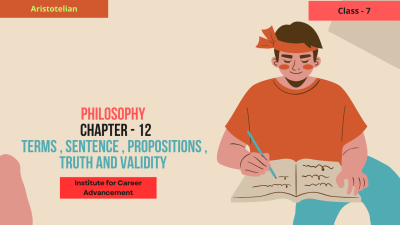Terms , Sentence , Propositions , Truth and Validity - Class 11

₹599
In the realm of logic, understanding the following concepts is fundamental: Terms: These are the building blocks of propositions. They can be single words or phrases that represent a concept, object, or property. For example, "cat," "justice," "the tallest building," "greater than." Sentence: A sentence is a grammatical unit that expresses a complete thought. It can be declarative (making a statement), interrogative (asking a question), imperative (giving a command), or exclamatory (expressing strong emotion). Not all sentences are propositions. Propositions: A proposition is a declarative sentence that is either true or false, but not both. It expresses a complete thought and can be evaluated for its truth value. Examples: "The Earth revolves around the Sun." (True) "2 + 2 = 5" (False) "All dogs are mammals." (True) Truth: The truth value of a proposition indicates whether it accurately reflects reality. A true proposition corresponds to reality, while a false proposition does not. Validity: In the context of deductive arguments, validity refers to the logical structure of the argument. An argument is valid if its conclusion follows logically from its premises. In other words, if the premises are true, the conclusion must also be true. Note: A valid argument can have false premises and a false conclusion. Key Points: Truth and Validity are distinct concepts: A valid argument can have false premises, and a sound argument must have true premises and a valid structure. Propositions are the foundation of logical reasoning: They provide the basic units of analysis for evaluating arguments and drawing conclusions. By understanding these core concepts, students in Class 11 can begin to develop critical thinking skills, analyze arguments effectively, and improve their ability to reason logically. যুক্তির ক্ষেত্রে, নিম্নলিখিত ধারণাগুলি বোঝা মৌলিকঃ শর্তাবলীঃ এগুলি প্রস্তাবের ভিত্তি। এগুলি একক শব্দ বা বাক্যাংশ হতে পারে যা একটি ধারণা, বস্তু বা বৈশিষ্ট্যের প্রতিনিধিত্ব করে। উদাহরণস্বরূপ, "বিড়াল", "ন্যায়বিচার", "সবচেয়ে উঁচু বিল্ডিং", "এর চেয়ে বড়"। বাক্যঃ একটি বাক্য একটি ব্যাকরণগত একক যা একটি সম্পূর্ণ চিন্তা প্রকাশ করে। এটি ঘোষণাত্মক (একটি বিবৃতি দেওয়া) জিজ্ঞাসাবাদমূলক (একটি প্রশ্ন জিজ্ঞাসা করা) আবশ্যক (একটি আদেশ দেওয়া) বা বিস্ময়কর (দৃঢ় আবেগ প্রকাশ) হতে পারে। সব বাক্য প্রস্তাবনা নয়। প্রস্তাবনাঃ একটি প্রস্তাব একটি ঘোষণামূলক বাক্য যা সত্য বা মিথ্যা, তবে উভয়ই নয়। এটি একটি সম্পূর্ণ চিন্তাভাবনা প্রকাশ করে এবং এর সত্য মূল্যের জন্য মূল্যায়ন করা যেতে পারে। উদাহরণগুলোঃ "পৃথিবী সূর্যের চারদিকে ঘোরে।" (সত্য) "2 + 2 = 5" (মিথ্যা) "সব কুকুরই স্তন্যপায়ী।" (সত্য) সত্যঃ একটি প্রস্তাবের সত্য মান নির্দেশ করে যে এটি সঠিকভাবে বাস্তবতাকে প্রতিফলিত করে কিনা। একটি সত্য প্রস্তাবনা বাস্তবতার সাথে মিলে যায়, যখন একটি মিথ্যা প্রস্তাবনা হয় না। বৈধতাঃ অনুমানমূলক আর্গুমেন্টের প্রসঙ্গে, বৈধতা আর্গুমেন্টের যৌক্তিক কাঠামোকে বোঝায়। একটি যুক্তি বৈধ যদি তার উপসংহার তার প্রাঙ্গণ থেকে যৌক্তিকভাবে অনুসরণ করে। অন্য কথায়, যদি ভিত্তিটি সত্য হয়, তবে উপসংহারটিও অবশ্যই সত্য হতে হবে। দ্রষ্টব্যঃ একটি বৈধ যুক্তির ভিত্তি মিথ্যা এবং উপসংহার মিথ্যা হতে পারে। মূল বিষয়গুলোঃ সত্য এবং বৈধতা হল স্বতন্ত্র ধারণাঃ একটি বৈধ যুক্তির মিথ্যা ভিত্তি থাকতে পারে এবং একটি সঠিক যুক্তির অবশ্যই সত্য ভিত্তি এবং একটি বৈধ কাঠামো থাকতে হবে। প্রস্তাবগুলি যৌক্তিক যুক্তির ভিত্তিঃ এগুলি যুক্তি মূল্যায়ন এবং সিদ্ধান্ত গ্রহণের জন্য বিশ্লেষণের মৌলিক একক সরবরাহ করে। এই মূল ধারণাগুলি বোঝার মাধ্যমে, একাদশ শ্রেণির শিক্ষার্থীরা সমালোচনামূলক চিন্তাভাবনা দক্ষতা বিকাশ করতে, কার্যকরভাবে যুক্তি বিশ্লেষণ করতে এবং যৌক্তিকভাবে যুক্তি করার ক্ষমতা উন্নত করতে পারে।
Learn more
 0
0 